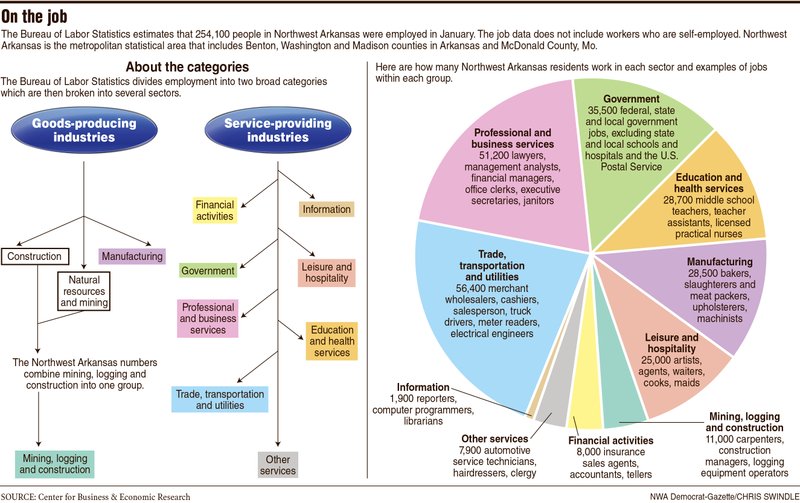The business of Northwest Arkansas is mostly related to doing business, but every job sector in the region is growing.
"The trade, transportation and utilities sector, that's the biggest," said Mervin Jebaraj, director of the Center for Business and Economic Research at the University of Arkansas. "It's kind of a super sector, and the second largest is professional and business services; again it's a pretty large sector itself."
The trade category includes jobs in retail and wholesale trade, trucking and warehousing. Professional and business service jobs include accounting, advertising, financial managers and office clerks.
Jebaraj said the professional sector is growing rapidly and, at some point, will probably overtake trade.
"They're pretty close together in terms of how much of the pie they represent," Jebaraj said.
The largest sector employs about 22 percent of the region's workforce while the professional and business services sector represents 20 to 21 percent, he said.
Education and health services, leisure and hospitality, and construction all continue to grow, Jebaraj said.
Mike Harvey, chief operating officer at the Northwest Arkansas Council, said the jobs people are doing in Northwest Arkansas have changed over the past 15 years. High-end white collar jobs of personal service professionals have been getting stronger in the concentration of workers, Harvey said.
"That does not surprise me at all because when you have a more affluent growth at the top, you get growth in the service sector," Harvey said. "A job in IT, a job in management, a job in financial services or computer science or something to that effect is going to have high enough wages to stimulate demand for service jobs."
He said service jobs, such as those at restaurants and retail shops, will also continue to grow going forward.
The sectors in order of growth are office occupations at third; business and financial occupations fourth; education fifth; personal care sixth; and management seventh, Harvey said.
"These are all big growers; I mean in the past 15 years all the ones I've mentioned are over 5,000 new jobs," Harvey said.
Some areas with high growth numbers include 15,000 new jobs in sales, more than 10,000 in food preparation and nearly 10,000 in office administration, he said.
"I can just go on and on," Harvey said. "There's only one occupation, literally, one group of occupations that has shrunk in the past 15 years, and that was production. Everything else has grown."
The region is also seeing a bump in health care professions.
"Health is a little weird because health is doing two things. We're becoming more of a health care center, in terms of just being a market, while we're also just catching up to the growth," Harvey said. "We're just trying to serve the population that's growing here, and it's been really difficult for health care to keep up."
Harvey said the shift toward white collar jobs combined with a large portion of tradesmen nearing retirement is creating some pretty good opportunities for younger people entering the workforce.
"An interesting thing that we're starting to see now is this real critical need for the skilled workers in the trades, not because there's a huge amount of growth there, but because you've got a lot of people retiring," he said. "So, these guys are all having shortages of laborers. There's a lot of good jobs, quite frankly, in the trades, and they're struggling to find people to do those jobs."
NW News on 03/25/2018

